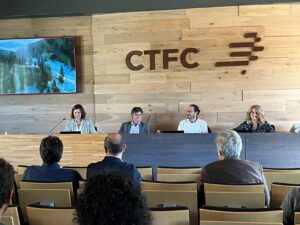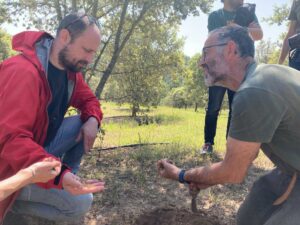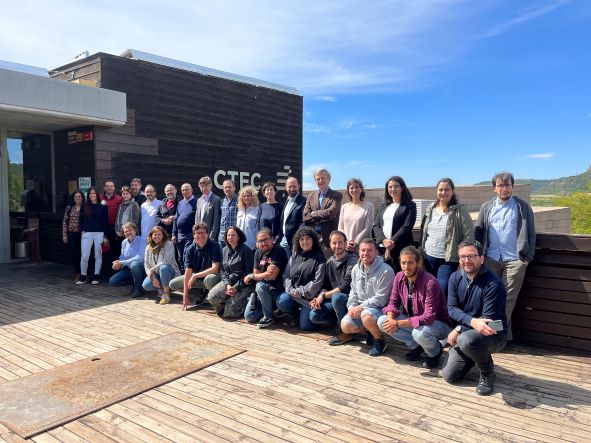This week the final conference of the PRIMA WildFood project was held in Solsona. The project was led by the CTFC and studied the value chains of wild edible Mediterranean products (such as truffles, mushrooms, pine nuts, acorns, or aromatic plants) to contribute to their development and promotion
The growing interest in local products, their sustainability, and social value has increased the demand for these products for their use in gastronomy; this, added to the high degree of informality in the sector, the climate crisis and drought, drives the need to regulate the sector and promote the sustainable cultivation of these products, as the conclusions of the project state
The culinary demand for edible wild products, such as truffles, mushrooms, pine nuts, and aromatic plants is growing, but their value chains are underutilized. This is one of the main conclusions of the European project PRIMA WildFood, which the Forest Science and Technology Center of Catalonia (CTFC) presented in Solsona. The institution, the leading partner of the project, urges for the regulation of this subsector and the promotion of the cultivation of these products to reduce the pressure on natural populations and avoid overexploitation. Including some of these products within the agricultural sector could allow producers to opt for financial aid to develop these activities, meet demand and face the challenges of the climate crisis. The development of this sector can contribute to the creation of work in rural areas, the fight against depopulation, and the conservation of the natural resources of the Mediterranean forests.
 The CTFC hosted the final conference of this European project, under the motto “Eating the Wild: Improving the value-chain of Mediterranean Wild Food Products.” The participants of the project presented the results as well as the recommendations for political action in front of an audience of about sixty people.
The CTFC hosted the final conference of this European project, under the motto “Eating the Wild: Improving the value-chain of Mediterranean Wild Food Products.” The participants of the project presented the results as well as the recommendations for political action in front of an audience of about sixty people.
The director of the PRIMA Foundation, Octavi Quintana, has warned that climate change, as well as the drought and the increase in temperature associated with it, represent the greatest challenge for the Mediterranean today, and has highlighted the importance of projects like PRIMA WildFood to work together on the complex and cross-sector solutions that are needed to deal with it.
Míriam Piqué, head of the CTFC’s Multifunctional Forest Management Program, has emphasized the importance of wild edible products for their social and economic value in rural areas and Mediterranean forests. 65% of the surface of Catalonia is covered by forests, and mushrooms, pine nuts, and truffles represent very important products for these forests.
PRIMA WildFood, which has been developed from May 2020 to June 2023, has focused on the study of the value chains of truffles, pine nuts, acorns, and aromatic plants in five Mediterranean countries: Spain, Slovenia, Italy, Portugal, and Tunisia. The project has also implemented eight pilot projects to develop management and planning systems and risk control techniques to improve the quality of Mediterranean wild products and their sustainability.
Two of these pilot experiences have been carried out in Catalonia: the feasibility study for the establishment in Tarragona of a mycological park to assess and control mushroom collection and guarantee its sustainability, and the quantification of pine nut production with sensors and drones in Girona.
In addition to improving the definition and regulation of this subsector, another of the recommendations addressed to political decision-makers, proposed by the CTFC, is the creation of a group certification system that helps local producers to help position their goods and deal with products imported from outside Europe, of lower price and lower quality. The PRIMA WildFood researchers have prepared a policy brief document that highlights the main recommendations to improve the definition and regulation of this subsector.
Among the results of the project, aside from the diagnosis of the value chains of edible wild products, a database of the producers and actors linked to this subsector has been prepared, a virtual platform has been created to give visibility to the actors of the sector and facilitate contact between them, and protocols and guides have been created to improve the quality, safety, and sustainability of the value chains of these products. A campaign to promote the consumption of these products has also been carried out, as well as an online training program aimed mainly at university students, but open to anyone who is interested.
 The final PRIMA WildFood conference has closed with a field visit to a truffle plantation. It is one of the wild forest products with the best gastronomic reception, but its production this year has particularly suffered from the consequences of the drought.
The final PRIMA WildFood conference has closed with a field visit to a truffle plantation. It is one of the wild forest products with the best gastronomic reception, but its production this year has particularly suffered from the consequences of the drought.
Last modified: 22 May 2023










